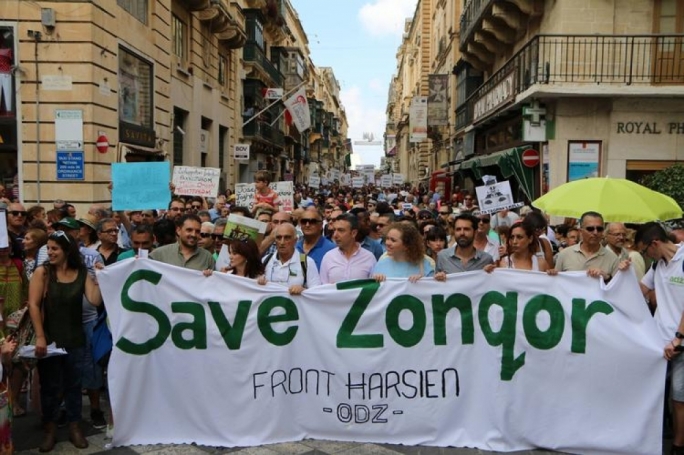
Civil society emerged as a force to be reckoned with as thousands took to the streets to protest the take up of ODZ land in Zonqor. But will this be enough to counter the lure of investment coming as a result of dishing out cheap public land to handpicked developers?
The year ends with parliament approving a land transfer which includes 18,000 square metres of ODZ land in Marsaskala to Jordanian construction company Sadeen Group following a tumultuous marathon parliamentary session.
Last May’s announced development of an ‘American University of Malta’ by a hand-picked construction firm sent shivers down the back of the entire environmental lobby, provoking 3,000 to take to protest on the streets of Valletta. Not only was the land entirely outside the development zones, but it was also a part of a designated national park included in the 2006 local plans.
Prime Minister Joseph Muscat, who says AUM will bring in a major foreign investment injection, has since split the 90,000 square-metre campus that was to gobble up a sizeable part of the proposed national natural park at Zonqor Point, across 18,000 square metres and to take up the forgotten Dock No. 1 waterfront in Bormla: a decision that suggests the 3,000 strong protest sent a strong message that could not be ignored.
Muscat’s partial U-turn was a vindication of the role of environmentalists as a force not to be ignored, especially when Front Harsien ODZ emerged as an organisation solely focused on public mobilisation.
While still leaving environmentalists unsatisfied by the outcome, which still saw the inclusion of ODZ land the size of three football grounds, the government seemed to have taken the upper hand in the debate. Environmentalists were faced by the dilemma on how to oppose the remaining ODZ part of the project, without embarking on a lost cause and being labeled, as Muscat put it, ‘absolutists’. Moreover government officials like MEPA CEO Johann Buttigieg sent conciliatory messages by hinting that alternative sites to Zonqor were still on the agenda.
Yet by rushing the transfer of land through parliament – including the Zonqor ODZ portion – in a marathon session on the eve of the Christmas season, Muscat transformed a purely environmental issue into an issue of good governance.
By pushing the land transfer before the accreditation of the new educational institution and the finalisation of the site selection exercise by MEPA, Muscat jumped the gun and once again reinvigorated opposition to the project. Details of the paltry sums Sadeen will pay in ground rent (from €40,000 in the first year to €1 million in the 31st year) and the revelation that Sadeen will be accredited as an institution for higher education and not as a university, gave new ammunition to critics of the project.
Even at local level the project has been engulfed by controversy as the mayor admitted bargaining for a €400,000 “investment” for the local council, in what was interpreted by critics of the project as a gift to neutralise any opposition from the council.
Moreover a final MEPA permit has not been issued for the project, and the authority can still technically refuse the project. The ODZ development in Zonqor – one of the largest ODZ developments in recent history – is also a litmus test for the newly created Environment Authority, which has now been granted the power to appeal against MEPA decisions. Will the new Environment Authority give its blessing to the loss of garigue or will it fight tooth and nail to protect it and thus underline its independence from government?
Sadeen’s sea-view dormitory at Zonqor however confirms Muscat’s belief that cheap land is an asset designed to lure in FDI: a warning sign for the environment if there ever was one. Muscat cannot resist the temptation of a development that can be spun as a ‘social’ project.
A private university for the children of the global rich has its economic benefits in attracting high-net-worth individuals to Malta, another part of Labour’s trickle-down strategy. Muscat may ultimately bank on the perception that he has achieved a ‘balance’ between development and the environment. He may well have used this experience to test the waters for future developments. He may also bank on the trickle down effect of such a project – which may see thousands of well-off students spending their monies in Malta. But the project has not only dented Muscat’s environmental credentials but more seriously it has undermined any pretence of good governance.
28 December 2015, 8:54am by James Debono (Malta Today)
The original article can be found here



